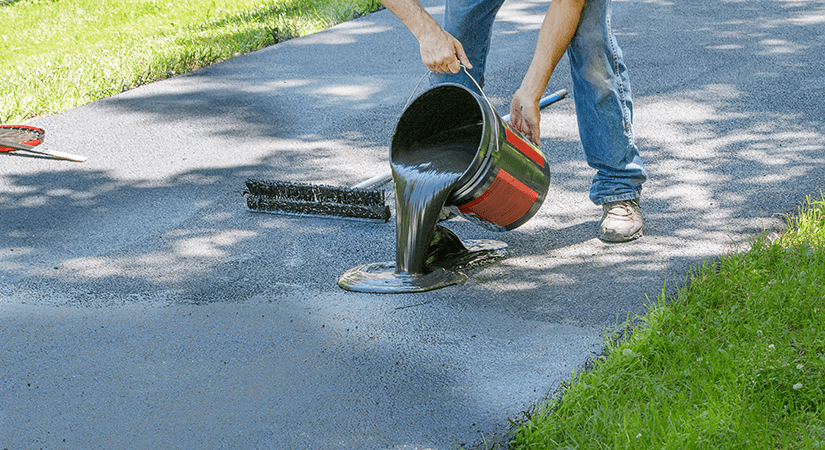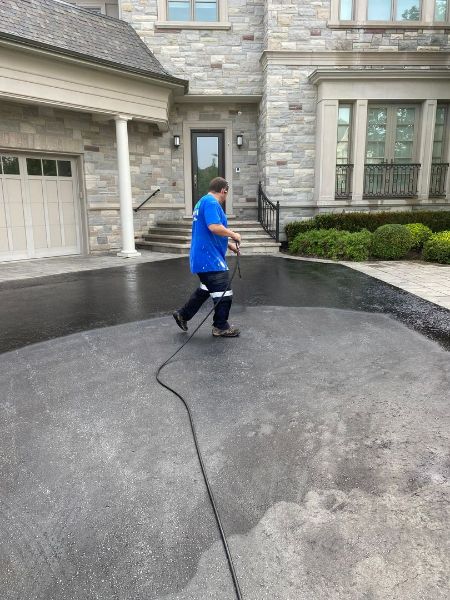Grasping Angled Parking: How Asphalt Sealing Boosts Business Whole Lots
Grasping Angled Parking: How Asphalt Sealing Boosts Business Whole Lots
Blog Article
Warm Mix Asphalt: A Sustainable Solution for Pavement
Hot Mix Asphalt (HMA) has arised as a leading sustainable selection for pavement services, providing a myriad of ecological benefits and innovative modern technologies. As the demand for green construction techniques expands, exploring the subtleties of HMA's sustainability can provide useful understandings into the future of sidewalk services.
Ecological Benefits of Warm Mix Asphalt

Moreover, Hot Mix Asphalt aids to alleviate urban warm island impacts. Its dark color takes in sunshine, lowering the amount of warmth showed back right into the environment contrasted to lighter-colored pavements. This can reduce ambient temperature levels in city areas, lowering the demand for a/c and inevitably lowering power consumption.
Furthermore, Warm Mix Asphalt adds to enhanced stormwater monitoring. Its permeable nature allows water to infiltrate the sidewalk and reenergize groundwater supplies, lowering drainage and the danger of flooding. These ecological advantages make Warm Mix Asphalt a sustainable option for leading roadways and freeways.
Energy Effectiveness in HMA Production
Is power effectiveness a critical consider the production of Hot Mix Asphalt (HMA)? Absolutely. Energy plays a considerable function in the production of HMA, influencing both price and ecological sustainability. One vital facet of energy performance in HMA production is the use of warm mix asphalt (WMA) technologies (angled parking). WMA enables the mixing and placement of asphalt at lower temperature levels contrasted to typical warm mix asphalt, resulting in decreased energy consumption during manufacturing. This process not only decreases gas use however additionally reduces greenhouse gas exhausts, making it an extra eco-friendly option.
Additionally, advancements in plant modern technologies have actually led to even more energy-efficient HMA production procedures. Modern plants are made with functions like recycled asphalt pavement (RAP) handling abilities, reliable heater systems, and boosted insulation, all contributing to power cost savings. By optimizing energy use in HMA production, the market can reduce its carbon impact while maintaining high-quality sidewalk products. Power efficiency is, therefore, a vital consideration in making certain the sustainability of Hot Mix Asphalt manufacturing.
Recyclability of Hot Mix Asphalt
The recyclability of Warm Mix Asphalt (HMA) is a pivotal element of its sustainability and lasting environmental impact. HMA is one of one of the most recycled products in the United States, with over 100 million heaps of redeemed asphalt pavement (RAP) being recycled yearly in brand-new sidewalk construction. Recycling HMA supplies several ecological advantages, such as reducing the need for virgin materials, lowering energy intake throughout manufacturing, and lowering the amount of waste sent out to land fills.
The process of recycling HMA includes grating the existing pavement, squashing it right into smaller items, and mixing it with brand-new aggregate and asphalt binder to develop a recycled mix. This recycled mix can often perform along with and even better than standard HMA, while requiring less basic materials and generating lower these details greenhouse gas exhausts. By incorporating RAP right into brand-new sidewalk jobs, roadway firms can preserve click this natural deposits, decrease expenses, and reduce the environmental impact of road building and maintenance activities. Overall, the recyclability of HMA plays a substantial role in promoting sustainable techniques within the sidewalk market.

Long-Term Efficiency of HMA
Asphalt pavements show resilience and durability over a prolonged period, showing the long-lasting efficiency of Warm Mix Asphalt (HMA) The longevity of HMA can be attributed to its ability to withstand rush hour loads, extreme weather condition problems, and the impacts of aging. Studies have revealed that properly designed and appropriately created HMA sidewalks can last for two decades or more with normal upkeep. The key to maximizing the long-lasting efficiency of HMA hinges on making use of top notch materials, adhering to best techniques in construction, and carrying out effective upkeep strategies. Appropriate drainage, routine examinations, and timely repairs are essential for maintaining the structural stability of HMA pavements over time. Additionally, developments in HMA technology, such as the use of polymer-modified binders and cozy mix asphalt, have actually further improved the longevity and durability of HMA sidewalks. By focusing on quality building and construction and maintenance practices, HMA remains to confirm itself as a sustainable and affordable solution for durable sidewalk infrastructure.

HMA: Sturdiness and Sustainability
Demonstrating both longevity and sustainability, Warm Mix Asphalt (HMA) has actually become a foundation in the construction of resilient sidewalk infrastructures - angled parking. HMA's durability originates from its capacity to stand up to hefty tons, rough weather conditions, and high web traffic quantities, making it a trusted choice for roads, freeways, and airport terminal paths. The composition of HMA, which typically consists of aggregates, binder, and filler, plays an essential role in improving its long life and resistance to tear and use
In addition, HMA's sustainability hinges on its recyclability and energy-efficient manufacturing procedure. The capacity to recycle recovered asphalt sidewalk (RAP) in brand-new HMA mixtures minimizes the need for virgin products and reduces the ecological impact of pavement building and construction and maintenance. In addition, the energy efficiency of creating HMA exists in its reduced mixing temperatures compared to various other pavement products, resulting in decreased energy usage and greenhouse gas exhausts.
Final Thought
To conclude, warm mix asphalt (HMA) offers a sustainable service for pavement with its eco-friendly qualities. HMA's recyclability, energy performance in manufacturing, and long-lasting resilience make it a green selection for roadway building and construction. Related Site By preserving natural deposits, decreasing waste, and lowering greenhouse gas emissions, HMA plays an essential role in advertising sustainability in facilities growth. Its capacity to alleviate metropolitan warm island effects further emphasizes its relevance in producing durable and environmentally conscious sidewalk systems.
HMA is one of the most recycled products in the United States, with over 100 million tons of recovered asphalt sidewalk (RAP) being reused each year in new sidewalk construction.The process of recycling HMA involves grating the existing pavement, squashing it right into smaller sized pieces, and mixing it with brand-new accumulation and asphalt binder to produce a recycled mix.Asphalt sidewalks demonstrate sturdiness and strength over an extended period, showing the long-term performance of Hot Mix Asphalt (HMA) Furthermore, innovations in HMA innovation, such as the usage of polymer-modified binders and cozy mix asphalt, have actually even more improved the durability and longevity of HMA pavements. The capacity to reuse redeemed asphalt sidewalk (RAP) in new HMA blends reduces the need for virgin products and decreases the environmental effect of sidewalk building and upkeep.
Report this page